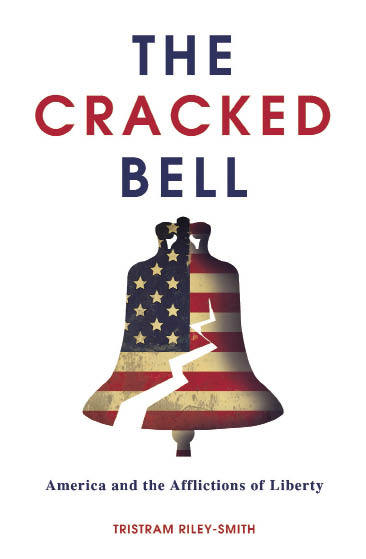People have written books about America long before the United States declared itself, and we may be forgiven for asking if we really need another. Doesn’t America already loom large enough in our world; hasn’t it all been said before? Well, yes and no. There’s a sense in which we’re all Americans now because that country is ourselves writ large or — as America might see it — set free. And although much of what is said here may have been said before, it’s rarely been said as concisely and well. Nor have the paradoxes that divide, and unite, that great country been so carefully and sympathetically delineated.
Tristram Riley-Smith takes his title from the famous Liberty Bell, allegedly rung when the Declaration of Independence was read out. It cracked in 1846 and the crack is now as renowned as the bell itself. They even put it on US postage stamps. But to Riley-Smith it symbolises the English ideal of freedom which was transported to America and there
inflated and distorted by a radical form of individualism . . . now undermining and afflicting the very society it was intended to underpin.
This elevation of freedom too often leads to selfishness and anarchy, and even to its opposite, the kind of social coercion exemplified by political correctness. Riley-Smith traces the crack through seven great themes of American life: identity, consumerism, belief, innovation, wilderness, war and peace, freedom and conformity.
He begins by asking who the Americans are. A mixture, as we know: about 1 per cent Native American, 10 per cent African-American, 15 per cent Hispanic, the rest mostly of European origin (though there are growing Asian communities and the US is home to the second largest Arab community outside the Middle East). This resulted not in the expected rich stew but in what one commentator called ‘a bunch of individual plates of foods or ingredients that don’t want to even touch each other.’ The issue of identity, says Riley-Smith, ‘lies like a watermark inside the fibre of the national existence.’ For Americans, identity is both first-person singular and plural, like an optical puzzle in which the image switches before your eyes. You can’t just be American; you’re black, white, Hispanic American or whatever. Obama’s promise of a post-racial America is a long way from fulfilment.
What do Americans do? Well, they shop. Their 20 feet of shelf-space per head is ten times that of the UK, ubiquitous advertising generates almost as much as the giant defence industry and Wal-Mart has a turnover greater than Pakistan’s:
The spirit of consumerism — aerated by the Jeffersonian mandate to pursue ‘happiness’ — falls like kerosene on the torch of liberty.
You can get anything, but the cost is that you become what you own. Americans work harder for it (longer hours, anyway — 395 a year more than in the UK) and they give more away — 2.1 per cent of GDP, which exceeds the advertising revenue. Yet inner-city poverty and violence continue unabated, and the national infrastructure — health provision, transport and communications — is often wanting.
About 95 per cent of them believe in God, with evangelism the dominant religious culture. A secular president would have to conceal lack of belief much as prime ministers here feel they have to play down possession of it. Religious divisions are deep, yet a common denominator runs through most American churches — ‘An extraordinary accommodation with the material world, imbuing commerce and consumerism with a semi-sacred lustre.’
America innovates more than anyone else, a fact often attributed to individualism and the frontier spirit. But even here there are paradoxes:
The positive, life-enhancing energy of innovation is contrasted with the enervating machinations of vested interests that channel power away from the many for the benefit of the few.
Although the greatest portion of innovations tends to come from newer arrivals, resources and influence are transmitted along power lines no less jealously guarded in today’s US than in medieval Italian city-states. The families, the clans, the societies and the patronage are all intact.
The Western frontier has long since disappeared, but the mythical, moral, psychological, emotional and poetical aspects of believing in, and striving for, it are still potent. Just as the UK was famously said to have spent 50 years coming to terms with the loss of empire, so ‘it could be said that the US has spent 100 years coming to terms with a frontier that no longer exists.’ Does Obama’s recent decision not to fund another moon walk mean that America has at last accepted that it is no longer a frontier society? Don’t bet the farm on it.
Riley-Smith concludes that American myth and symbolism ‘carry greater substance and gravity than inconvenient facts and “realities” ’. This is probably true of most peoples, but arguably more so with Americans. It matters more, too, because America’s is the dominant world culture, the effect of which is to persuade many (by no means all) to see them as they see themselves — for good and ill.
But to what extent are the paradoxes of America distinctly American, or part of a wider Anglo-Saxon conundrum? Riley-Smith’s thoughtful discussion of US/UK similarities and dissimilarities reinforced in me the depressing conclusion that this country has come to value comfort more than freedom, passivity more than endeavour, and is fuelled by an envious egalitarianism.
Riley-Smith is more optimistic. Engagingly pro-American but robustly critical, probably sharing Obama’s aspirations but sceptical of the ability of one individual to change culture, he nevertheless believes that the cracked bell can be re-cast. America itself has the wherewithal to heal itself of its great flaw, which runs — if less starkly — through us all. It is ‘probably a feature of our humanity, with the US — that great experiment in political science — providing the conditions to amplify and expose it.’
That is why America matters to us all and why this book should be read.






Comments